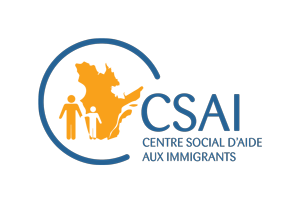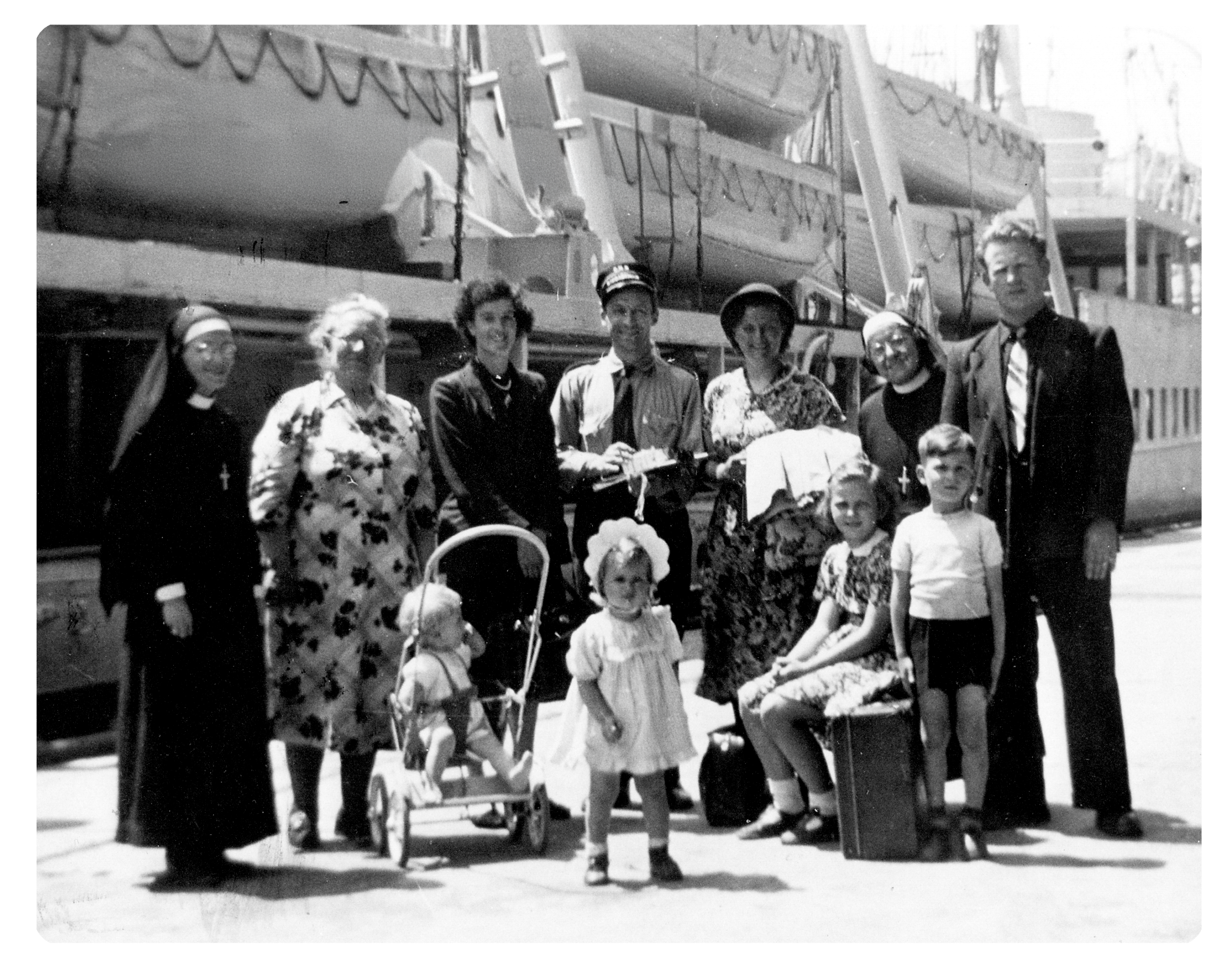
A Journey Through Time: The Story of CSAI’s Commitment to Immigrants
Since its founding in 1947 by the Institut Notre-Dame du Bon-Conseil, the Centre Social d’Aide aux Immigrants (CSAI) has welcomed thousands of refugees and played a pivotal role in helping them build new lives in Montreal. From humble beginnings to becoming a key pillar in the immigrant community, CSAI’s history is a testament to resilience, compassion, and evolution.
From welcoming young Canadian women to welcoming refugees from German work camps
“To love one’s neighbor is first of all to seek to re-establish normal living conditions in their favor.” Marie Gérin-Lajoie

The Early Days: A Response to Global Crises
CSAI’s story begins amidst the aftermath of World War II. As Europe grappled with destruction, countless people were forced to flee, seeking refuge in safer countries. The Canadian government committed to taking in 10,000 displaced individuals, asking provinces to participate in this massive humanitarian effort. However, resources for helping these new arrivals adapt—like language training or job placement—were scarce.
Enter Sister Marie Gérin-Lajoie and the Institut Notre-Dame du Bon-Conseil. Already experienced in supporting young women moving to Montreal for domestic work, the institute was approached by the Catholic Church to assist in welcoming refugees. Without hesitation, Sister Marie opened the doors of their home on 4285 Western Street, first to young girls and later to entire immigrant families. This marked the birth of CSAI, a place where newcomers could find support, guidance, and hope.
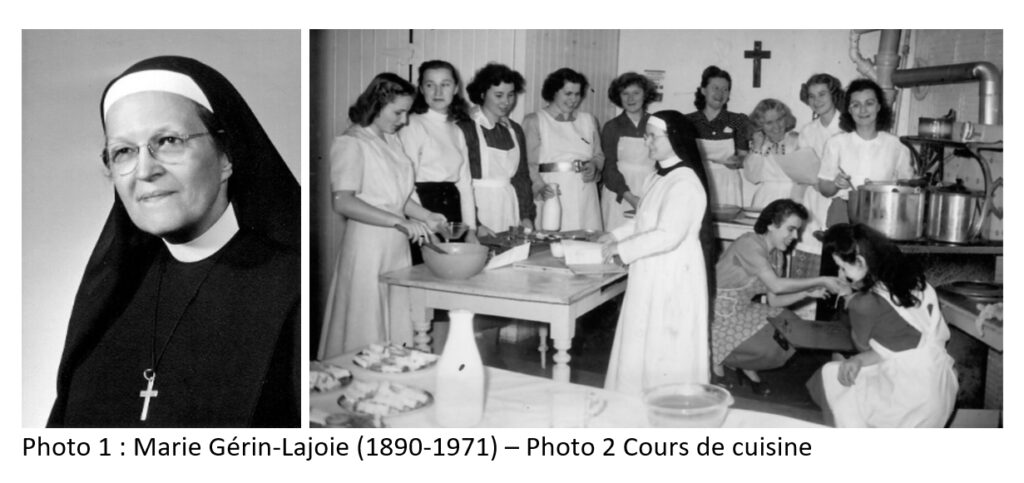
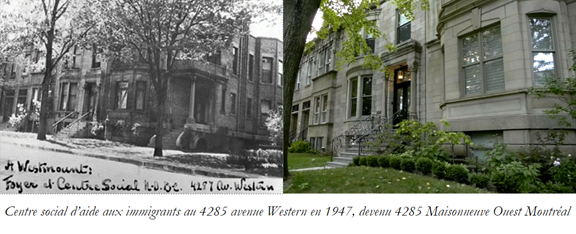
1947 to the 1960s: Building a Foundation
From the moment CSAI was established, it became a beacon of hope for those seeking a fresh start in Canada. With no government subsidies or programs in place at the time, CSAI stepped in to fill the gap, offering essential services to help immigrants navigate their new environment.
During these formative years, CSAI grew alongside the evolving immigration policies in Canada, adapting to the shifting needs of the communities it served. Its focus was clear: to provide practical support while fostering a welcoming environment for all.
Adapting to Change: A History of Growth and Evolution
As global conflicts and immigration patterns changed over the decades, so did CSAI’s mission. In 1984, the organization was recognized with a prestigious award for its contributions, and by 1996, CSAI had secured its letters patent, formalizing its role as a cornerstone of integration services in Montreal.
Today, CSAI operates four service points, offering a wide range of support to temporary residents, international students, workers, refugees, and asylum seekers. Whether through employment assistance, language courses, or navigating complex immigration processes, CSAI continues to evolve to meet the needs of new arrivals.
Discover CSAI’s Rich History
To celebrate CSAI’s 75th anniversary, we’re excited to share its history in four captivating chapters. The journey begins with the foundation years from 1947 to the 1960s, covering the challenges and triumphs that shaped the early mission. In our upcoming newsletter, we’ll explore the next chapters, diving into the organization’s growth through the 1970s to the 2000s.
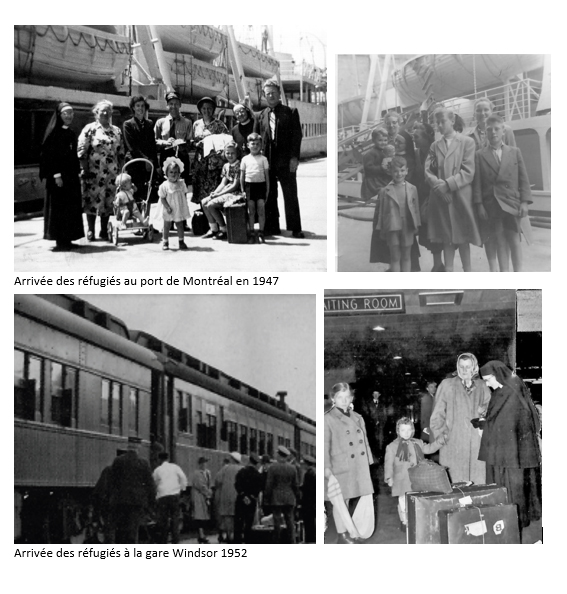
A Legacy of Compassion and Action
CSAI’s origins are deeply intertwined with global events and the collective effort to provide refuge to those in need. From the early days of welcoming displaced individuals post-World War II to becoming a professional, community-based organization, CSAI’s legacy is one of compassion, adaptability, and unwavering support for immigrants.
Stay tuned as we continue to share more about CSAI’s rich history and its ongoing commitment to making Montreal a welcoming home for all.
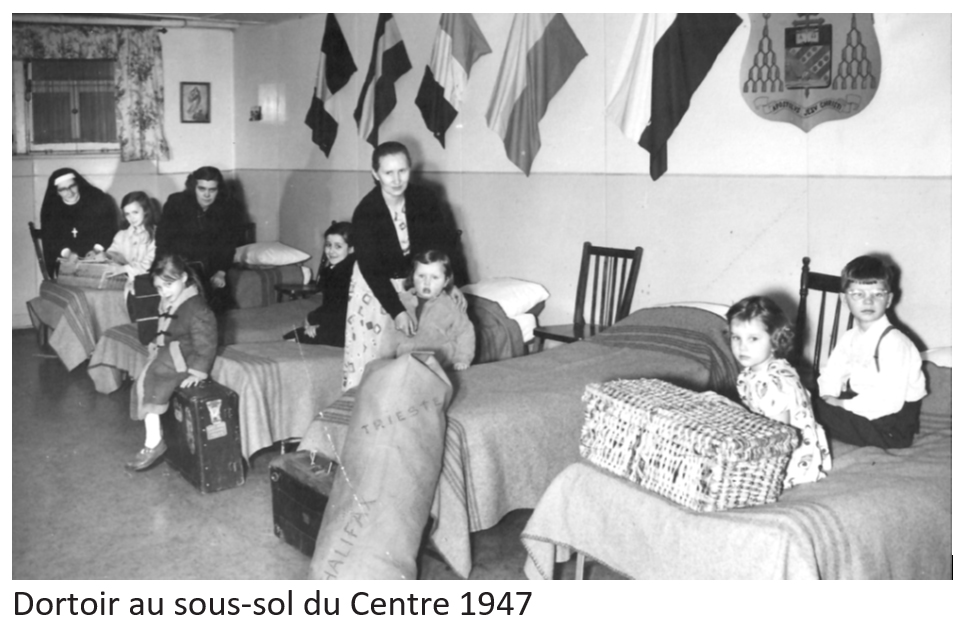
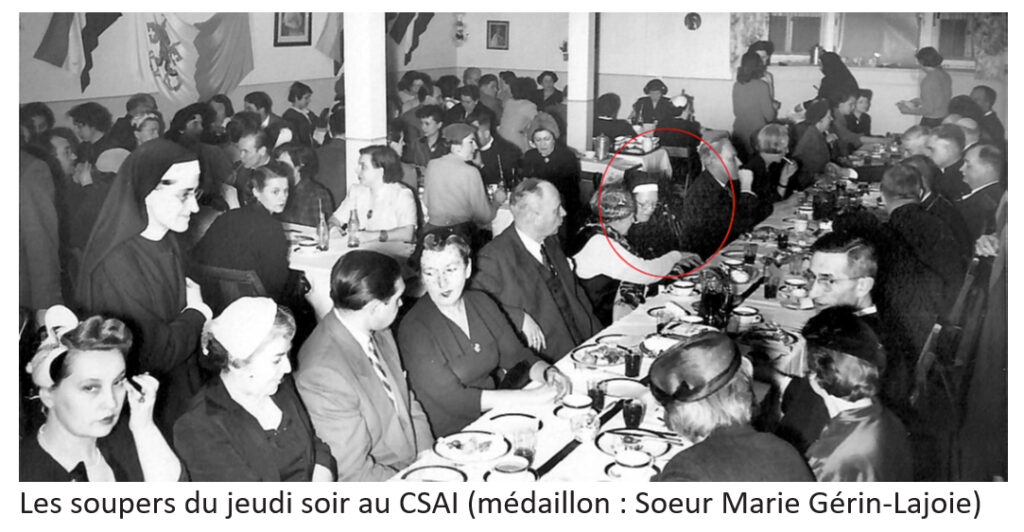
Welcoming the First Refugees from Eastern Europe
The post-war years saw an influx of refugees from Eastern Europe seeking safety and new beginnings in Canada. The Centre Social d’Aide aux Immigrants (CSAI) played a crucial role in welcoming these newcomers, many of whom arrived from countries like Poland, Lithuania, Russia, Romania, Hungary, and Czechoslovakia.
In October 1947, the first train carrying refugees from Halifax arrived at Montreal station. The sisters of CSAI, led by Sister Marie Loyola Normandin and her successors, were committed to making these arrivals as smooth as possible. They greeted refugees at every point of entry—Windsor Station, the Port of Montreal, and later, the airport—handing out information translated into Polish, Ukrainian, and German to ensure that every newcomer knew where to turn for help.
CSAI’s Commitment: Adapting to the Needs of New Arrivals
From its early days, CSAI was a lifeline for refugees adjusting to life in Canada. The center’s doors were open seven days a week, year-round, providing a safe space for immigrants to seek assistance with everything from housing and employment to healthcare and education.
The staff, both religious and lay volunteers, tailored their services to the evolving needs of the community, helping newcomers with:
- Finding or changing employers
- Temporary accommodations
- Filling out forms for family reunification
- Language classes in French and English
- Cooking and sewing workshops

Group activities such as folklore evenings, documentary screenings, and lectures were also organized to help foster a sense of community and belonging. In times of crisis, the sisters went above and beyond, converting rooms into makeshift dormitories to accommodate up to thirty immigrants in need.
The Beloved Tradition of Thursday Suppers
A unique and heartwarming tradition began in 1947—the Thursday Suppers. Spearheaded by Sister Marie Loyola Normandin, these suppers quickly became a cornerstone of CSAI’s community efforts. Initially intended for young women working as domestic servants, the gatherings soon expanded to include a diverse group of refugees and immigrant volunteers.
Every Thursday, individuals gathered for a communal meal that offered more than just food—it was a chance to build friendships, share experiences, and find valuable information about life in Quebec.
After supper, participants could choose from various activities:
- Leisure and cultural exchange: Relax in the lounge, enjoy talks from newcomers or Quebec personalities, and participate in shows featuring national folklore, song, and dance.
- Language learning: Join classes to improve French or English skills.
- Counselling services: Seek guidance from social services counsellors.
This warm, multi-ethnic gathering space became an essential weekly ritual, providing both practical support and emotional connection for many.
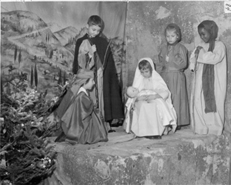
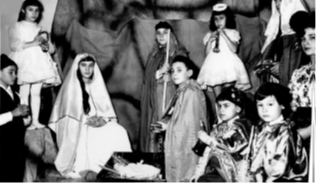
CSAI: Adapting to the Changing Waves of Immigration
At the Centre Social d’Aide aux Immigrants (CSAI), the story of immigration is one of adaptation and resilience. Over the decades, CSAI has evolved in response to shifting global socio-political landscapes and the Canadian government’s changing immigration policies. Let’s take a closer look at how CSAI has adapted to support immigrants from diverse backgrounds, starting in the late 1940s.

Welcoming Polish Orphans: A New Beginning in 1949
In September 1949, a significant wave of young Polish orphans arrived in Quebec. These children, victims of World War II, were given new opportunities to rebuild their lives. 83 boys were entrusted to brothers, while 67 girls were placed under the care of sisters. Initially, they stayed in holiday camps, with the older girls seeking work supported by CSAI’s efforts.
By December, all the girls had found homes—some with convents and others with Polish families. CSAI became a home away from home for these children, offering a place for joyful reunions, especially during the Christmas season. Events like the living crib brought the community together, fostering a sense of belonging and celebration.
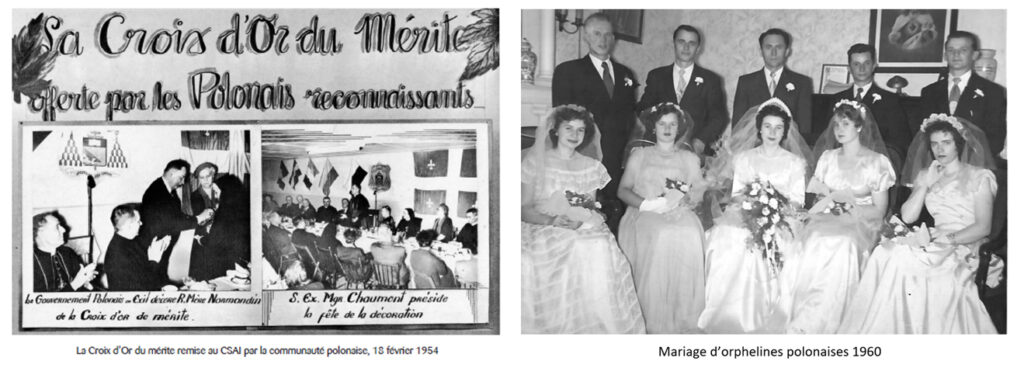
A Growing Community: New Initiatives and Recognition
The Avenir multi-ethnic family camp began in 1953 as part of CSAI’s mission to create inclusive spaces for families of diverse backgrounds. Recognizing the invaluable contributions of CSAI, Sister Normandin was awarded the Gold Cross of Merit by the Polish government in exile in 1954.
As immigration to Canada increased, CSAI played a pivotal role in assisting new arrivals. Between 1949 and 1955, CSAI welcomed waves of immigrants from Slavic countries, followed by French and Belgian newcomers. The organization helped families find housing, offered temporary accommodations, and supported them in setting up their new homes—all without government aid at the time.
Adapting to New Challenges: Hungarian and Portuguese Refugees
In 1956, CSAI mobilized its volunteers to assist Hungarian refugees arriving under a special federal program. By 1957, CSAI was welcoming Portuguese immigrants from the Azores and newcomers from the Middle East, including Egyptians, Lebanese, and Syrians.
The early 1960s brought another wave of Belgians, French, and Swiss immigrants. CSAI’s adaptability and commitment ensured that each group received the support they needed to settle successfully.
The 1960s: A Shift Toward Equality and Inclusion
In 1962, Canadian immigration laws changed, ending discrimination based on colour, race, or creed. This marked a turning point, opening Canada’s doors to immigrants from a broader range of backgrounds.
The landmark Expo 67 event in Montreal further diversified the immigrant population, welcoming people from Africa, Asia (especially India), and Latin America. CSAI embraced this diversity, helping newcomers from across the globe find their footing in a new country.
Quebec’s Immigration Vision: A New Chapter in 1968
With the establishment of Quebec’s own immigration department in 1968, the province aimed to attract more French-speaking immigrants. Quebec introduced a points-based selection system that prioritized education, skills, and language proficiency over race. This new approach brought a rich tapestry of immigrants to CSAI, including Moroccans, Haitians, Portuguese, Italians, Central Africans, Vietnamese, and Hungarians. When Warsaw Pact troops entered Czechoslovakia in 1968, CSAI stepped up to assist the influx of Czechoslovakian refugees, demonstrating its ongoing commitment to supporting those in need.
A Landmark Moment: Signing the Geneva Convention in 1969
In 1969, Canada signed the Geneva Convention relating to the Status of Refugees, a major milestone that shaped the future of refugee support in the country. This decision, 18 years after the convention’s adoption by the United Nations, signaled a shift toward a more inclusive approach to refugee protection—an ethos that CSAI had embraced from the beginning.
Looking Ahead: The Next Chapters of CSAI’s Story
As CSAI continues to adapt to the ever-changing landscape of immigration, we remain dedicated to supporting immigrants in their journey toward integration and success. Stay tuned for the next installment of CSAI’s history, covering the 1970s to the 2000s, in our upcoming newsletter. If you haven’t subscribed yet, we invite you to join our community and stay connected with CSAI’s ongoing mission to make Montreal a welcoming home for all.
Work cited
FINES, Daniel, Le Centre social d’aide aux immigrants, Québec Monde, Gouv. du Québec, Ministère de l’immigration, No 36, février 1979
Journal La Presse, 16 janvier 1954. La Maison du Bon Dieu. Rencontres fraternelles d’immigrants de 22 pays. Une œuvre admirable poursuivie depuis longtemps par les Sœurs de Notre-Dame du Bon Conseil. Un climat d’amitié et d’entraide.
LANGLAIS, Lorette, Dernières nouvelles du CSAI. 2008
LANGLAIS, Lorette, Le Centre social d’aide aux immigrants, Impressions, Cégep du Vieux Montréal, décembre 1995, No 22.
Le Centre social d’aide aux immigrants, 35 ans d’immigration au Québec, Univers, No 4, 1982
Le Centre social d’aide aux immigrants, Bulletin réfugiés d’Indochine, vol. 1 No 4, août 1979
MALOUIN, Marie-Paule, Aider les immigrants (183-196) dans Entre le rêve et la réalité. Marie Gerin-Lajoie et l’histoire du Bon-Conseil. Édition Bellarmin
NORMANDIN, Marie-Loyola, Le Centre social d’aide aux immigrants, La voix des oeuvres, vol 1V, no 2, 1954
NORMANDIN, Marie-Loyola, Les limites à l’exercice de la charité dans l’accueil des migrants, Ma paroisse, Montréal, août 1958
PROULX, Monique, Le Centre social d’aide aux immigrants (22-26), dans l’Interculturel au Québec : philosophie et pratiques des organismes gouvernementaux, volume XXVII, No 2, printemps 1994
PROULX, Monique, Les Réfugiés dans Les nouveaux visages de la pauvreté, Institut québécois de recherche sur la culture, 1987
VAN DUN, Frans, Le Centre social d’aide aux immigrants (413-417), Tout quitter pour la liberté. Cinq parcours d’immigrants.
